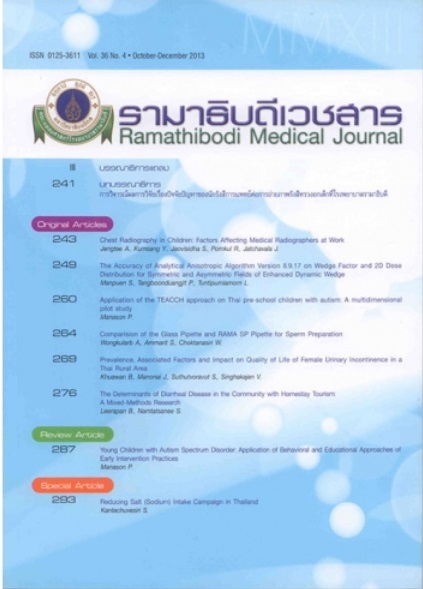Application of the TEACCH Approach on Thai Pre-school Children With Autism: A Multidimensional Pilot Study
Keywords:
Autism, ABA, TEACCH, InterventionAbstract
In recent years, the term Autism Spectrum Disorder of ASD was widely known as one of the world largest phenomenon disorder. Many researchers have shown the radio of children with ASD compared to normal ones was approximately 1:88, which is unexpectedly increased for the last five years. While the ASD was claimed as a neurobehavioral syndrome caused by a dysfunction in the central nervous system, which leads to disordered development, three general categories of behavioral impairment were shown. Common to all persons who have autism are composing of qualitative impairments in social interaction, qualitative impairment in communication, and restricted repetitive and stereotyped patterns of behavior, interest, and activities. With the inappropriate behaviors, most of young children with ASD usually are not attend schools. Even though a small number of intervention programs that claimed to help these children behave appropriately in order to abridge the gap of disabilities have worked intensively on researching interventions with young children with ASD and their families, the reality uses of these programs are still in this study. This research intervention was aimed to help these children in order to develop their appropriate behaviors by using two behavioral adjustment programs called Applied Behavioral Analysis (ABA) combined with Treatment and Education of Autistic and Communication-Handicapped Children (TEACCH). Twelve children who participated in this research intervention are 4 years of age and older and have a confirmed of mild to moderate Autism Spectrum Disorder (ASD). This research intervention offered a variety of therapeutic and support services to these pre-school children with ASD, including: family education and counseling, school visit, and parent support groups combined with one-on-one behavioral adjustment program specifically. As the result of these techniques, all of these twelve children were accepted to study in the schools in kindergarten level.
References
Humphrey N, Parkinson G. Research on interventions for children and young people on the autistic spectrum: a critical perspective. 2006;6(2):76-86.
Schreibman L. Intensive behavioral/psychoeducational treatments for autism: research needs and future directions. J Autism Dev Disord. 2000;30(5):373-378.
Rogers SJ. Empirically supported comprehensive treatments for young children with autism. J Clin Child Psychol. 1998;27(2):168-179.
Callahan K, Shukla-Mehta S, Magee S, Wie M. ABA versus TEACCH: the case for defining and validating comprehensive treatment models in autism. J Autism Dev Disord. 2010;40(1):74-88. doi:10.1007/s10803-009-0834-0.
Howard JS, Sparkman CR, Cohen HG, Green G, Stanislaw H. A comparison of intensive behavior analytic and eclectic treatments for young children with autism. Res Dev Disabil. 2005;26(4):359-383.
Schopler E. International priorities for developing autism services via the TEACCH model. International J Mental Health. 2000;29:3-7.
Mesibov GB. Sear V. The culture of autism: From theoretical understanding to educational practice. Division TEACCH, Department of Psychiatry, University of North Carolina at Chapel Hill: 1998.
Callahan K, Henson RK, Cowan AK. Social validation of evidence-based practices in autism by parents, teachers, and administrators. J Autism Dev Disord. 2008;38(4):678-692.
Odom S, Brown W, Frey T, Karasu N, Smith-Canter L, Strain P. Evidence-based practices for young children with autism: contributions for single-subject design research. Focus on Autism and Other Developmental Disabilities. 2003;18:166-175.
American Psychiatric Association. Diagnostic and statistical manual of mental disorder (4th edition). Washington, DC: Author; 1994.
Schopler E. Lansing MD. Reichler RJ. Marcus LM. Individualized assessment and treatment for autistic and developmentally disabled children: Psychoeducational profile 3rd Edition (PEP-3). Austin, TX: Pro-Ed 2004.
Tsang S. Shek D. Lam L. Tang F. Cheung, P. Brief Report: Application of the TEACCH program on Chinese pre-school children with autism-Does culture make a difference? J Autism Developmental Disorders. 2007:37:390-6.













